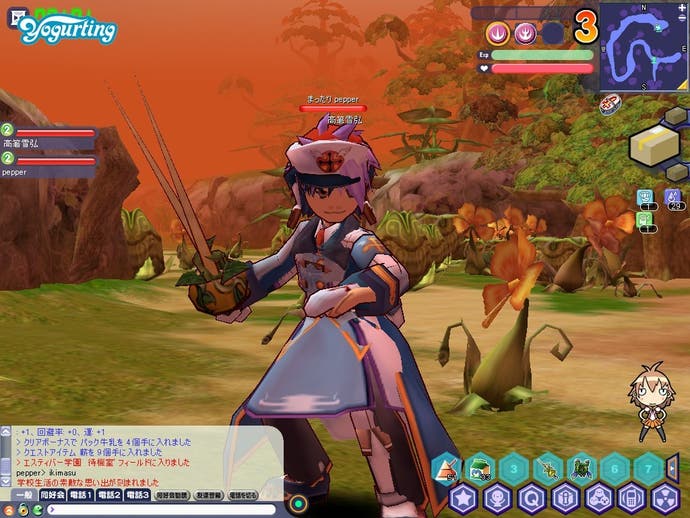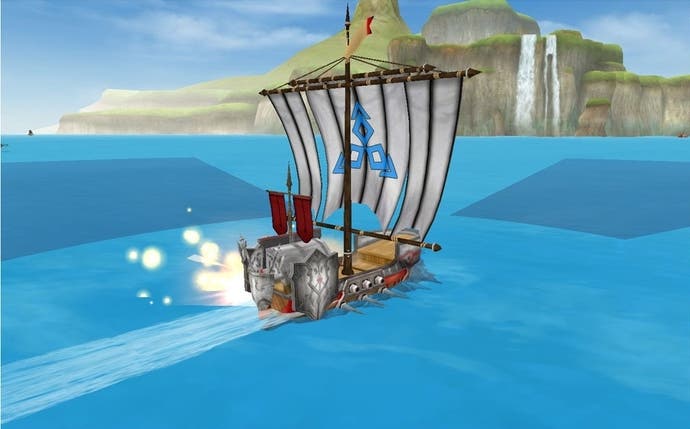Geek Purgatory
Trapped in an all-night manga cafe with Japanese MMOs.
What you end up doing, then, is playing quests on your own, which makes the game exactly like MH2 anyway, except with a house for which you can earn or buy display items. It's also seemingly impossible to play if you're not based in Japan, which scuppers my chances of finding anyone back home who'll play it with me. Oh well. It's not the only Japanese-developed MMORPG. "Taste the salt on your lips while a gentle breeze from the seaside fondles your heated face!" claims Florensia. Who are we to argue with that?
Florensia is an absolutely brand new pirate-themed MMO, and also playable in English, German, French and four other languages if you feel like it. I went for it because of the blue-skied, wide-eyed Skies of Arcadia feel (and because it was the only other thing on that manga cafe PC that didn't require a stupidly complex sign-up process). Eurogamer MMO took a look at it back when it was in open beta, and not much has changed; it's still a pretty-looking anime-style pirate MMO with amazingly unimaginative questing and entertaining sea-battles. The Japanese servers are busy, though, with a lot of new players joining up and a massive content update apparently on the way.
Perhaps it's to be expected that Florensia would prove popular, at least initially. It has a lot in common with PangYa and Ragnarok Online, the two most popular online games in Japan - it's grind-heavy, anime-styled and free-to-play. The only popular MMO in Japan that doesn't make its money from microtransactions is FFXI. It seems that in this hugely time-poor culture, people are unwilling to invest a monthly sum in a game, and instead prefer to put time in when they can, buying themselves an advantage with real money from the in-game shop when they feel the need. It rather removes the elitism that springs up in time-heavy MMOs. Instead of working for hours and hours to get your hands on a hat with cat ears, you can just buy one for 50p if you like the look of it.

Or, you could play Yogurting. It's Korean too, but it was so unpopular there that the servers ended up shutting down, whereas they remain inexplicably well-populated in Japan. You can get around the security and play this from anywhere in the world if you can figure out the sign-up procedure. It's basically a game in which you fight monsters in and around a high school. I'll admit to not having the faintest idea what's going on in Yogurting most of the time. It took me hours to find the upgrade penguin, and an hour more to realise that half the items in the game were unusable to me because I was from the wrong school.
I'm much more at home in Danpara, or Dance Battle Audition as we know it - a game in which a variety of strange Japanese men pretend to be teenaged girls and dance around for points. The fact that this game is still popular actually speaks volumes for its appeal. It takes the mildly creepy grooming of other teenaged-pop-star management games like The Idolmaster and marries it with rhythm-action and, yes, microtransactions. Nobody seems to be remotely embarrassed about playing this. Just as you see rows of men sitting at the constantly-occupied Idolmaster machines at the arcade, polishing their 14-year-old pop starlet's glasses, it's not hard to catch a glimpse of Danpara if you let your eyes stray to others' screens in cyber cafes.

One thing that's clear about Japanese MMO gaming culture is that it's much more disparate than our own. There is no WOW, no one hub of online questing activity to which everything else aspires to an extent, and from which most other games' populations tend to migrate. Instead, you have a random selection of free-to-play, almost exclusively Korean-developed fantasy RPGs, Final Fantasy, a wildly popular MMO golf game and yet another Monster Hunter, apparently played mostly by insomniacs and salarymen on their daily hour off between work and sleep. Wherever the next MMO revolution is brewing, it's almost certainly not here.
